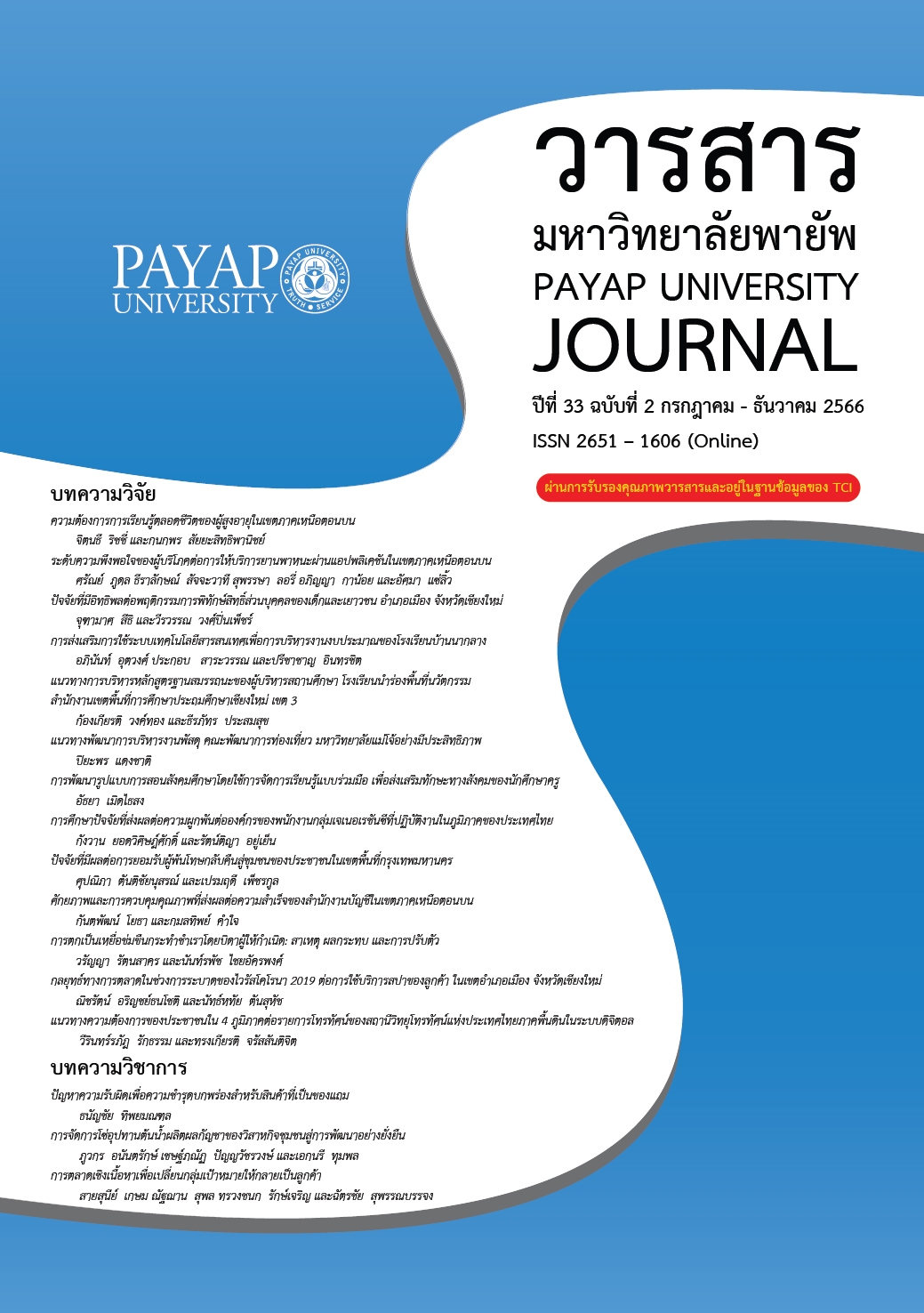แนวทางพัฒนาการบริหารงานพัสดุ คณะพัฒนาการท่องเที่ยว มหาวิทยาลัยแม่โจ้ อย่างมีประสิทธิภาพ
Main Article Content
บทคัดย่อ
การวิจัยครั้งนี้มีวัตถุประสงค์เพื่อ 1) ศึกษาความพึงพอใจต่อการบริหารงานพัสดุ ของคณะพัฒนาการท่องเที่ยว มหาวิทยาลัยแม่โจ้ 2) วิเคราะห์ปัจจัยที่ส่งผลต่อประสิทธิภาพ การบริหารงานพัสดุของเจ้าหน้าที่พัสดุ คณะพัฒนาการท่องเที่ยว มหาวิทยาลัยแม่โจ้ และ 3) กำหนดแนวทางการพัฒนาการบริหารงานพัสดุของคณะพัฒนาการท่องเที่ยว มหาวิทยาลัยแม่โจ้ ที่มีประสิทธิภาพ รูปแบบการวิจัยเป็นการวิจัยเชิงปริมาณ ประชากรที่ใช้ในการศึกษาครั้งนี้ คือ ผู้มีส่วนได้ส่วนเสียกับการบริหารงานพัสดุ จำนวน 27 คน เครื่องมือที่ใช้ในการเก็บรวบรวมข้อมูล คือ แบบสอบถาม วิเคราะห์ข้อมูลด้วยสถิติพรรณนา และการวิเคราะห์การถดถอยเชิงพหุคูณ แบบขั้นตอน
ผลการวิจัย พบว่า ปัจจัยที่ส่งผลต่อประสิทธิภาพการบริหารงานพัสดุของเจ้าหน้าที่พัสดุ คณะพัฒนาการท่องเที่ยว มหาวิทยาลัยแม่โจ้ พบว่า ปัจจัยที่ส่งผลต่อประสิทธิภาพการบริหารงานพัสดุสูงสุด คือ ปัจจัยด้านกำหนดความต้องการ เนื่องด้วยการกำหนดความต้องการ เป็นปัจจัยสำคัญที่ส่งผลให้การบริหารงานพัสดุเป็นไปตามวัตถุประสงค์ของหน่วยงานที่ตั้งไว้ รวมถึงการใช้งานให้เกิดประโยชน์สูงสุด นอกจากนี้ การกำหนดแนวทางการพัฒนาการบริหารงานพัสดุให้มีประสิทธิภาพ สามารถสรุปได้ 4 ประเด็น ดังนี้ 1) การแก้ปัญหาการซ่อมบำรุงล่าช้าสำหรับงานการเรียนการสอน 2) การแก้ปัญหาข้อจำกัดในการจัดซื้อกับห้างร้าน บริษัทที่มีเครดิตกับภาครัฐ 3) การแก้ปัญหาสถานที่เก็บพัสดุที่คับแคบ และ 4) การดูแลรักษาอุปกรณ์การเรียน และความทันสมัยของคอมพิวเตอร์
Article Details
เอกสารอ้างอิง
จรัส พรดีมา. (2550). การพัฒนาการดำเนินงานพัสดุโรงเรียนบ้านหัวขัว (เบญจคุรุราษฎร์อุทิศ) อำเภอนาโพธิ์ จังหวัดบุรีรัมย์ [วิทยานิพนธ์ปริญญามหาบัณฑิต, มหาวิทยาลัยมหาสารคาม]. ThaiLIS Digital Collection.
เฉลิมชัย อุทการ. (2562). ปัจจัยของการบริหารงานพัสดุที่มีต่อประสิทธิภาพการบริหารงานพัสดุของนักวิชาการพัสดุในมหาวิทยาลัยมหาสารคาม. วารสารการบัญชีและการจัดการ มหาวิทยาลัยมหาสารคาม, 12(1), 55-65.
ทัศนีย์ เสียงดัง. (2559). กลยุทธ์การบริหารงานพัสดุที่ส่งผลต่อประสิทธิภาพของการบริหารพัสดุ. [วิทยานิพนธ์ปริญญามหาบัณฑิต, มหาวิทยาลัยราชภัฎลำปาง]. ThaiLIS Digital Collection.
พระราชบัญญัติการจัดซื้อจัดจ้างและการบริหารพัสดุภาครัฐ พ.ศ.2560. (2560, 24 กุมภาพันธ์). ราชกิจจานุเบกษา. เล่ม 134 ตอนที่ 24 ก, หน้า 13-53.
มหาวิทยาลัยแม่โจ้ คณะพัฒนาการท่องเที่ยว งานบริการวิชาการและวิจัย. (2564). ประวัติความเป็นมา. https://tds-research.mju.ac.th/wtms_about.aspx?&lang=th-TH
ระเบียบกระทรวงการคลังว่าด้วยการจัดซื้อจัดจ้างและการบริหารพัสดุภาครัฐ พ.ศ. 2560. (2560, 23 สิงหาคม). ราชกิจจานุเบกษา. เล่ม 134 ตอนพิเศษ 210 ง, หน้า 1-72.
รัตนา อาสาทำ. (2562). ปัจจัยที่ส่งผลต่อประสิทธิภาพการบริหารงานพัสดุในมหาวิทยาลัยราชภัฎภาคตะวันออกเฉียงเหนือ. [วิทยานิพนธ์ปริญญามหาบัณฑิต, มหาวิทยาลัยราชภัฎมหาสารคาม]. ThaiLIS Digital Collection.
สมใจ ลักษณะ. (2547). การพัฒนาประสิทธิภาพในการทำงาน. มหาวิทยาลัยราชภัฎสวนสุนันทา.
อุทัย หามนตรี. (2558). การเขียนคู่มือปฏิบัติงาน. สำนักศึกษาทั่วไป มหาวิทยาลัยมหาสารคาม.


